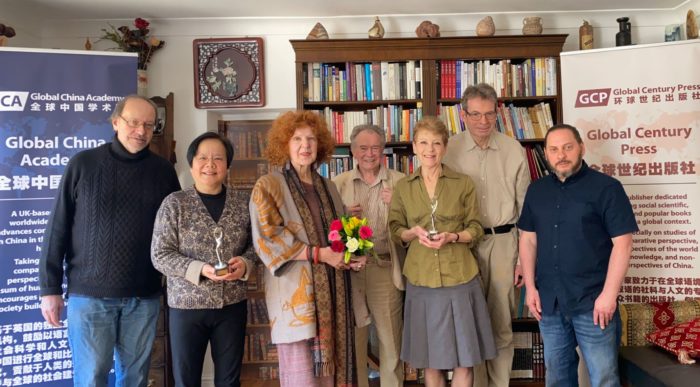
Leadership Transition, Dialogue and Outreach: GCA Activities in May 2024
At the GCA Board of Trustees meeting on February 23, 2024, an important agenda item for the Any Other Business (AOB) session was to schedule the Summer meeting for May 9. The session will welcome the new Chair and Secretary, and bid farewell to the outgoing Chair and Secretary.

On May 9, all the Trustees participated in the hybrid meeting. From left to right: Xiangqun Chang, Mark Lee (who joined the meeting after being elected Trustee and Secretary), Grace Yuan Cheng (online), Thomas Clarke, Maria Jaschok (new Chair), and Charles Grant.

Top left and right: Professor Maria Jaschok, representing the Trustees, thanked the former Chair, Ingrid Cranfield, and presented her with an ‘Oscar’ as a token of their appreciation for her work with GCA and GCP. The former Secretary, Dr. Francis Wood, was unable to attend due to illness. Professor Xiangqun Chang received the ‘Oscar’ on her behalf and will present it to her in due course.
Bottom photos on the left and right: Professor Martin Albrow, the Founding and Honorary President of GCA, presented flowers to Professor Maria Jaschok, the new Chair of the Board of Trustees, and welcomed Mark Lee to support GCA. The photo in the middle signifies the GCA’s Board of Trustees continuing the past and forging ahead.
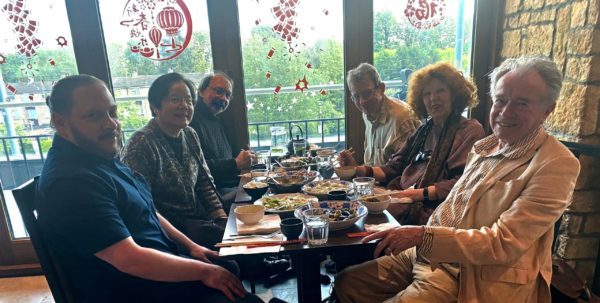
After the meeting, some participants of the GCA Board meeting decided to experience the newly developed GCA’s Route 6 of the Six ‘walk and talk’ routes, which included tea and lunch. The above photo shows them having lunch at the Real China Restaurant at the Galleria Outlet Shopping Centre in Hatfield.
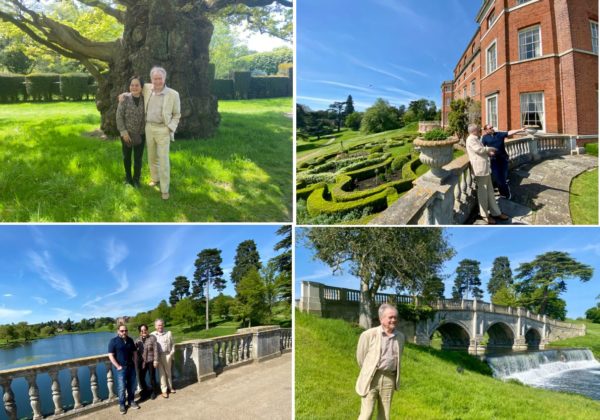
Professor Martin Albrow, Professor Xiangqun Chang, and Mark Lee enjoyed their walk and talk at Brocket Hall very much after the lunch.

On the following day, Professor Xiangqun Chang visited Ingrid Cranfield’s home. She enjoyed Ingrid’s homemade cake, summer fruit, and relaxed conversation, especially the observations of her pet peahen and chicken. Although pigeons typically symbolize peace, the harmonious coexistence of these pets could also represent hope for humanity.
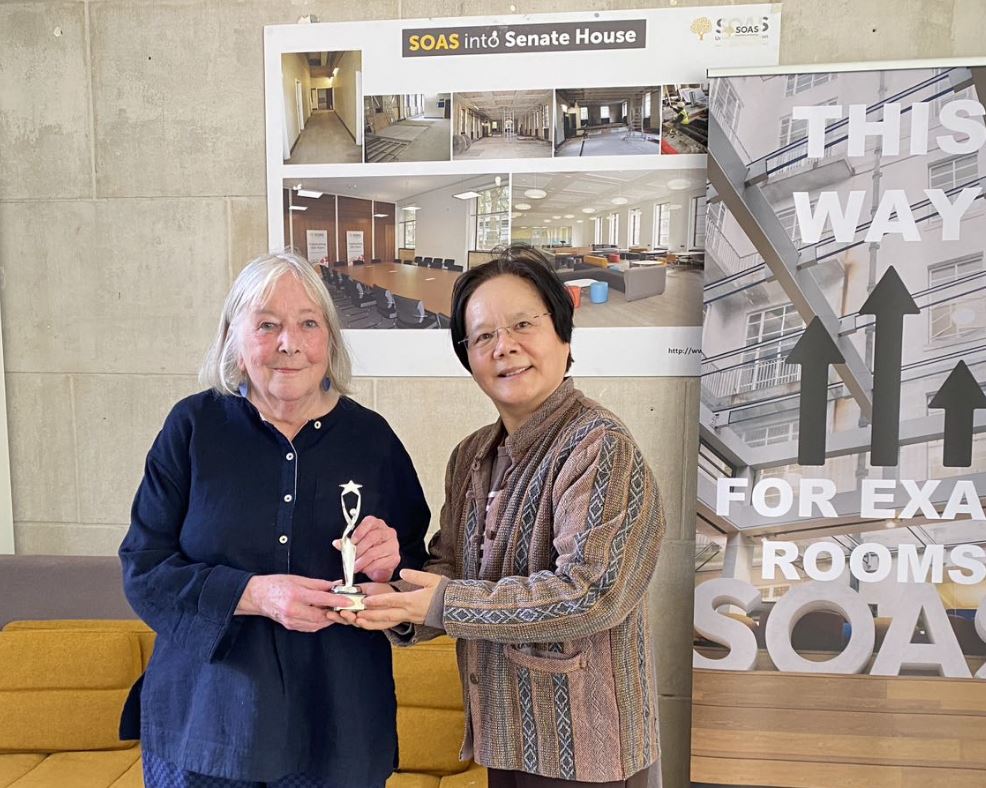
On the occasion of participating in a public lecture entitled ‘The Construction and Development of Digital Dunhuang’ on the 29th of May at SOAS, Professor Xiangqun Chang had a meeting with Dr Frances Wood. She greatly appreciated Dr Wood’s continued support for GCA and GCP with her academic and professional expertise in her personal capacity in the future. Professor Chang expressed gratitude for Dr Wood’s contributions to GCA and GCP in the past years and presented her with an ‘Oscar’ on behalf of the Chair of the Board of Trustees.
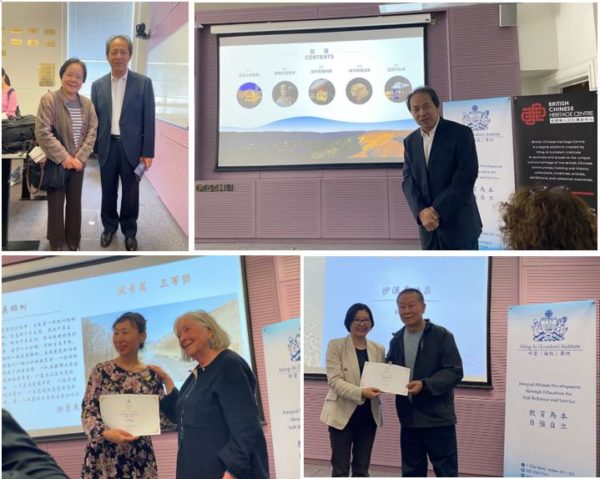
Top left: Professor Xiangqun Chang with WU Jian, Professorial Research Fellow of the Dunhuang Institute, the speaker of ‘The Construction and Development of Digital Dunhuang.’ They discussed the possibilities of a collaborative publication project on the theme of transculturality based on a vast amount of digital materials.
Top right: Professor Wu Jian gave a public lecture. According to him, Dunhuang was an important cultural node on the ancient Silk Road in China, witnessing the exchange and integration of Eastern and Western cultures. After more than 30 years of exploration and research, Digital Dunhuang formed a complete technological process suitable for the digital collection, processing, and storage of immovable cultural relics, and methods for constructing Digital Dunhuang, showcasing massive digital achievements and application scenarios of Digital Dunhuang. This lecture focused on the artistic value inheritance of the Dunhuang Grottoes, aiming at the digital preservation of cultural heritage for its sustainable inheritance. It started from the significance of advanced digital technology empowering cultural heritage protection and inheritance and discussed the development, achievements, and innovations in the three important stages of digital protection of Dunhuang Grottoes.
Following the public lecture, there was the Digital Photography Exhibition ‘Dream Back to Dunhuang.’ The bottom photos show Dr. Frances Wood (left) and Mr. Qu Leilei (right), the UK-based artist, presenting certificates to the winners of the Digital Photography Exhibition.
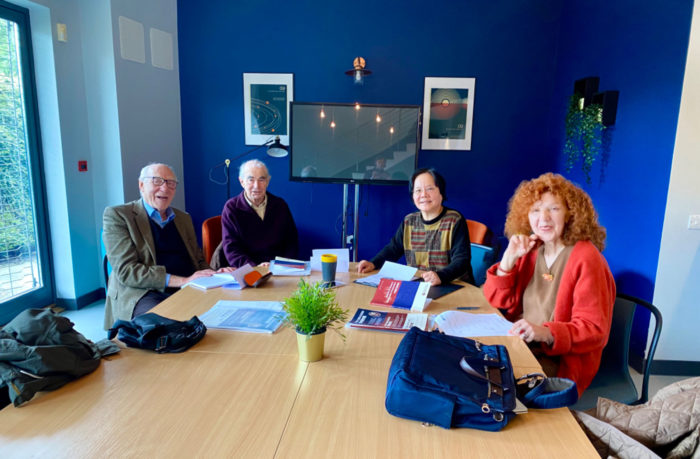
Global China Academy’s Activities in April 2024
On April 17, Professor Xiangqun Chang visited GCA Fellows at the University Club at Oxford. The fellows are Professor David Parkin, Professor Robin Cohen, and Professor Maria Jaschok. In the morning, they conducted a broad range of discussions. During lunchtime, in addition to discussing work, Professor David Parkin suggested that we should also add a little living to our life. In the afternoon, Xiangqun and Maria discussed detailed work on the GCA Board of Trustees. It was a very productive day.
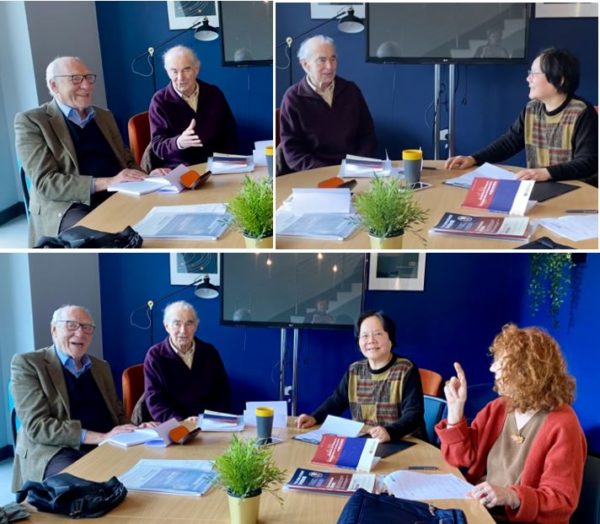
From left to right: Robin Cohen, David Parkin, Xiangqun Chang, and Maria Jaschok. The discussion meeting was similar to a brainstorming session. Based on incomplete audio records, the following topics were covered:
- Transculturality:
- Definition and examples of transcultural practices.
- The concept of transculturality as a tool for understanding global dynamics beyond globalization.
- Comparison between Chinese and Western approaches to transculturality.
2. Reciprocity and Social Exchange:
- Different types of reciprocity: generalized, balanced, and negative exchange.
- The role of reciprocity in social relationships and its implications in different cultural contexts.
3. Academic Contributions and Challenges:
- The need for a Chinese school of sociology and its contributions to global social science.
- The challenges faced by Chinese academics in the global academic landscape.
- Strategies for integrating Chinese perspectives into global academic discussions.
4. Social Practices and Their Cultural Significance:
- The influence of Chinese cultural practices on social relationships and community building.
- Examples of social practices in Chinese villages and their implications for social structure.
5. Historical and Comparative Studies:
- Comparative studies on modernization in different countries.
Historical encounters between Europe and China and their impact on cultural exchange. - The role of Chinese academics in documenting and analyzing these historical interactions.
6. Globalization and Modernization:
- The evolution of globalization and its various forms.
The concept of modernization in China and its comparison with Western perspectives. - The impact of globalization on local cultures and practices.
7. Role of Chinese Women and Feminism:
- The development of Chinese feminism and its integration into global feminist discourse.
- Historical perspectives on Chinese women’s roles and contributions.
8. Networking and Collaboration:
- The importance of collaborating with similar institutions to sustain the mission of the Global China Academy.
- Potential partnerships with organizations like the United Nations Alliance of Civilizations (UNAOC).
9. Impact and Sustainability of the Global China Academy:
- Strategies for ensuring the sustainability of the academy.
The role of publications and academic dialogues in promoting the academy’s mission. - The importance of engaging younger generations in the academy’s work.
10. Fieldwork and Ethnographic Studies:
- Personal anecdotes and experiences from fieldwork in China.
- The significance of understanding local contexts and social dynamics through ethnographic research.
11. Political and Cultural Mapping:
- The role of maps in representing cultural and political relationships.
- The influence of mapping practices on understanding global connections and power dynamics.
12. Challenges of Publishing Uncensored Chinese Work:
- The difficulties in publishing authentic, uncensored academic work on China.
- The role of the Global China Academy in providing a platform for such publications.
13. Global Governance for AI:
- This is the theme of the 9th Global China Dialogue, which will take place at Tongji University in China. It is the first time the event will be held in China, and it will alternate between the UK and China in the future.
- The preparations are ongoing.

Global China Academy Council Chair Professor Tony McEnery’s Academic Activities in Hong Kong and China, March to April 2024
Introduction
In 2024, Professor Tony McEnery’s academic activities expanded in various ways. On the one hand, he led a team from Lancaster University to Xi’an Jiaotong University, establishing academic relations between the two universities in March. On the other hand, his influence extended from Xi’an, Zhejiang, and Shanghai to Kunming and Hong Kong where he gave conference paper and distinguished lecture respectively in April.
Timeline
On the 1st March, Tony McEnery from Lancaster University led a delegation to visit Xi’an Jiaotong University, discussing collaborative opportunities with the School of Foreign Studies and the International Cooperation and Exchange Office. The meeting included Professors Paul Baker, Elena Semino, and Jonathan Culpeper, along with Lei Yanjun, Deputy Director of the International Cooperation and Exchange Office, and leaders from the School of Foreign Studies at Xi’an Jiaotong University. The discussions focused on the shared goals and strategies of joint educational programs, including curriculum development and faculty training. Both sides expressed a desire to deepen the partnership based on their existing collaboration. Lancaster University is ranked 122nd in the 2024 QS World University Rankings and 10th globally in linguistics. Since 2021, the two universities have collaborated on various projects, including the Ministry of Science and Technology foreign expert program and the ‘High-End International Expert Masterclass’ series. This visit aimed to further consolidate their strategic partnership.
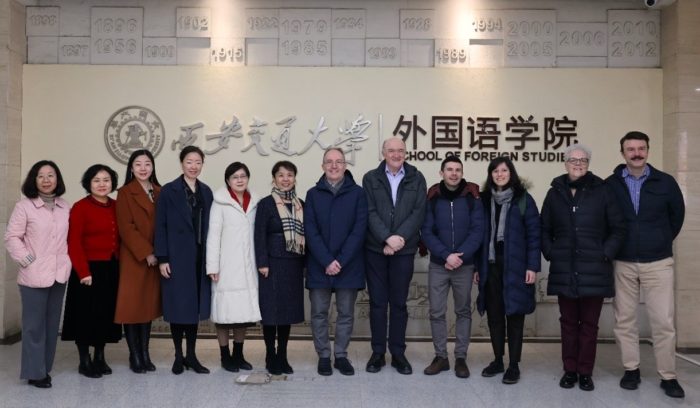
Source: https://news.xjtu.edu.cn/info/1005/206782.htm
Later the morning, the Foreign Language and Culture Forum at Xi’an Jiaotong University was held, featuring three primary speakers: Professor Elena Semino from Lancaster University, a Fellow of the British Academy of Social Sciences and the Royal Society of Arts, and Director of the ESRC-CASS Research Center; Professor Tony McEnery, a leading international scholar in corpus linguistics and a Distinguished Professor at Lancaster, who also serves as a guest professor at Xi’an Jiaotong University; and Vittorio Tantucci, the China Collaboration Officer for Lancaster University’s Department of Linguistics and English Language.
Professor Semino (top left) gave a lecture titled “Disease and Metaphor.” Using collected data and corpora, she demonstrated the metaphors used to describe different disease experiences and noted that the effectiveness of metaphors depends on how they are expressed. She emphasized that understanding metaphorical expressions relevant to different healthcare stakeholders is crucial for their practical application in disease treatment. Professor McEnery (top right) discussed the expression and usage of “swear words” in English dialogues from a discourse analysis perspective. He emphasized the importance of understanding the discourse structure of such forms and their effects in particular contexts. Afterward, attendees had a lively discussion with him on cultural differences in the use of this language. Dr. Tantucci (bottom left) provided an overview of Lancaster University and its Department of Linguistics and English Language, detailing its primary research areas. He also elaborated on the collaborative master’s program in English Language and Literature between Lancaster University and Xi’an Jiaotong University.
The forum stimulated enthusiasm among attendees for linguistics, particularly data-driven linguistic research, providing a platform for students and faculty to broaden their academic horizons and gain knowledge of the latest research trends.

Source: https://sfs.xjtu.edu.cn/info/1244/7284.htm
In the afternoon, the ‘Foreign Language and Culture Forum’ organized by the School of Foreign Studies was successfully held. The forum featured Professor Jonathan Culpeper, head of the Department of Linguistics and English Language (LAEL) at Lancaster University, Paul Baker, professor at Lancaster University and a Fellow of the Royal Society of Arts and the British Academy of Social Sciences, and Raffaella Bottini, the Internationalization Director of LAEL. The event was chaired by Vice Dean Cheng Bing and was attended by over a hundred students and faculty members.
This forum combined themed lectures with audience Q&A. Professor Culpeper (top left) delivered a lecture titled ‘Linguistic (Im)politeness and Reciprocity,’ focusing on communication etiquette in daily life. Using numerous examples, he vividly illustrated the differences between polite and impolite language, offering a detailed analysis of the linguistic principles and communication psychology involved. He paid special attention to patterns of conversational reciprocity, revealing politeness strategies and cultural variations. Professor Baker’s lecture (top right), titled “Corpus-Based Discourse Analysis,” explained the application of corpus analysis in linguistic research. He provided many examples demonstrating the unique value of corpus analysis techniques in exploring language usage patterns and uncovering societal and cognitive trends. This sparked interest among attendees in linguistic research methods. Finally, Director Bottini (bottom left) introduced the collaborative exchange program between Xi’an Jiaotong University and Lancaster University. This program offers a broad platform for faculty and students from both universities to collaborate, fostering in-depth academic and educational interactions while supporting international development.
The Foreign Language and Culture Forum not only provided new academic insights but also built an important bridge between Xi’an Jiaotong University and Lancaster University. The academic discussions and program introduction broadened the international outlook of attendees and promoted cross-cultural exchange and understanding. This has injected new vitality and momentum into collaboration between the two universities in education and research. Future cooperation between Xi’an Jiaotong University and Lancaster University is expected to deepen, promoting the development and prosperity of international education.
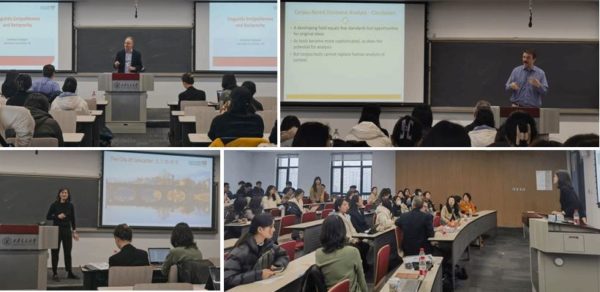
Source: https://sfs.xjtu.edu.cn/info/1244/7285.htm
On the 4th March, Professors Tony McEnery and Paul Baker from Lancaster University delivered lectures at at the School of Foreign Studies, Zhejiang Gongshang University.
Professor McEnery (top left), a renowned expert in corpus linguistics, focuses his research on applying corpora, contributing significantly to sociolinguistics, pragmatics, discourse studies, comparative linguistics, translation, and language teaching. His lecture entitled ‘Swearing, Discourse, and Function in Conversational British English’. He began by introducing academic concepts such as ‘macrostructure’ and ‘microstructure’ in discourse and critiqued existing research flaws concerning swearing and macro discourse structures. Building on this, he outlined the core theme of his lecture. Throughout the lecture, Professor McEnery demonstrated methods and approaches for analyzing swearing using corpora, covering the selection of research data, annotation of natural data, and data analysis and interpretation. He provided in-depth explanations about annotating spoken data, discourse units and functions in swearing analysis, and sequential structures of swearing within macro-narrative structures, sparking reflection and discussion. Lastly, he engaged with the audience on questions like ‘How to handle coding ambiguities?’ His patient and detailed answers benefited everyone greatly.
Professor Baker (top right) gave a keynote speech titled ‘An Overview of Corpus-Based Discourse Analysis.’ The report first emphasized the importance of language in shaping positions, representing identities, and conveying evaluations. He pointed out that analyzing large-scale language data can reveal the cumulative effects of language, leading to his proposed “Corpus-Assisted Discourse Studies” (CADS) approach and introducing the “description-interpretation-explanation-evaluation” research paradigm. In his lecture, Professor Baker highlighted the value of this research approach with four case studies: the image of bachelors in British media, the debate in the British Parliament on fox hunting, patient feedback in the UK’s National Health Service, and British news media’s coverage of obesity. These studies demonstrate the significant value of corpus research methods in helping linguists gain insights into discourse and society and fostering collaboration with other disciplines.
They were chaired by Professor Qian Yufang (bottom right), the lecture attracted many young faculty members, doctoral students, and master’s students who participated and exchanged ideas. The lively and academically rich atmosphere left a strong impression.
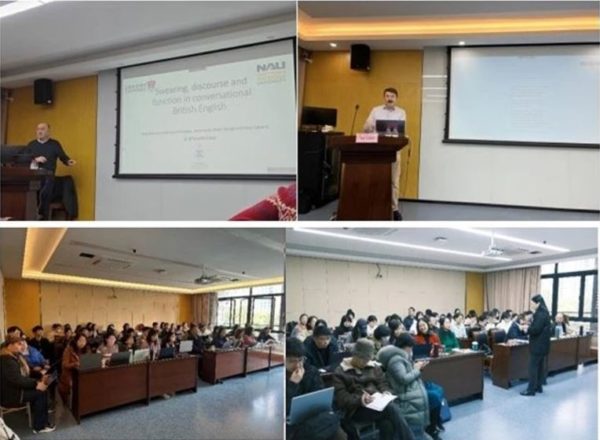
From March 5 to 7, Professor Baker conducted a three-day workshop on ‘Corpus-Based Discourse Analysis’ for the faculty and students of the School of Foreign Studies. The first session discussed ‘Visual Analysis of an Obesity News Corpus,’ primarily focusing on analyzing the interaction between textual and visual elements in The Daily Express’s coverage of obesity. The second session explored ‘Sociological Analysis of Language and Gender in a Spoken Corpus.’ The third workshop centered on ‘Corpus Analysis of Patient Feedback,’ aiming to understand patient feedback in the UK’s National Health Service. The fourth workshop addressed “Keywords in News Corpora.” The workshops were chaired by Professors Li Wenzhong and Pu Jianzhong.
This academic event attracted many faculty members and students, including university staff and undergraduates, master’s students, and PhD. candidates at various stages. The event was fully attended, creating a strong academic atmosphere. The Q&A sessions were especially lively, with attendees asking questions and engaging in discussions. Participants found the experience invaluable, gaining a solid understanding of key corpus discourse research methods and recognizing the importance of choosing research topics, clarifying research questions, collecting data, and determining research approaches
Sources: https://mp.weixin.qq.com/s/yay61_sACX38bDR4bmPs7Q and https://sky.zjgsu.edu.cn/2024/0402/c2108a169400/page.htm
On the 5th of March, as an Advisory Professor (2023-2026) at Shanghai International Studies University (SISU), Professor Tony McEnery delivered a lecture at the Institute of Corpus Studies and Applications at SISU. The lecture, titled ‘Swearing, Discourse, and Function in Conversational British English,’ examined the role of macrostructures in the study of swearing. While macrostructures have been studied in isolation, they have not yet been comprehensively analyzed, and the range of those studied is limited. In contrast, research on microstructures is better developed. Using spoken corpus data from BNC2014, the lecture presented two approaches to studying discourse. The first approach explored spoken data annotated with a functional discourse coding scheme that reveals the distribution of a set of macrostructures (discourse units) that generally characterize conversation. The goal was to observe how swearing is distributed according to discourse unit function and explain any patterns identified. The second approach focused on a single macrostructure of discourse—narrative—and its sub-elements, to determine whether swearing interacts with this macrostructure and its components. The lecture concluded by emphasizing the importance of discourse as a dimension along which the use of swearing can vary, likely in relation to emotion. The complementary perspectives on macrostructure discussed in the lecture further underscore this point.
Sources: https://corpus.shisu.edu.cn/corpusen/ae/dd/c12945a175837/page.htm and https://corpus.shisu.edu.cn/bd/7d/c10015a179581/page.htm
On the 22nd April, Professor Tony McEnery presented paper on ‘Corpus-based View on News Media Representation of Slavery in the 19th Century Britain’ at An International Conference on Brain, Language, and Communication, Kunming, 22-23 April 2024. It was co-organised by School of Journalism (College of International Communication of South and Southeast Asia), Yunnan University, Subcommittee of Journalism and Communication, the South and Southeast Asian University Network, and the Halliday Centre for Intelligent Applications of Language Studies, City University of Hong Kong, in partnership with Yunnan Key Laboratory of Media Convergence.
This conference is organized on the theme of brain, language, and communication. It is motivated by the latest consensus that the interdisciplinary collaboration across the three will generate synergies to enable the sustained growth and development of communication studies and linguistic research, particularly for corpus-based approaches and neurolinguistics. This collaboration is also timely, in response to the latest development in artificial intelligence as well as the initiatives in Nuralink implant research that highlight the interaction across the three important subjects. The event brings together some of the internationally outstanding scholars in linguistics, media communication and data science on their cutting-edge research in the cross-feeding between language, communication, the understanding of the human mind and their statistical models. The conference therefore showcases some of the most recent developments in research topics, methodologies and findings in the relevant areas.
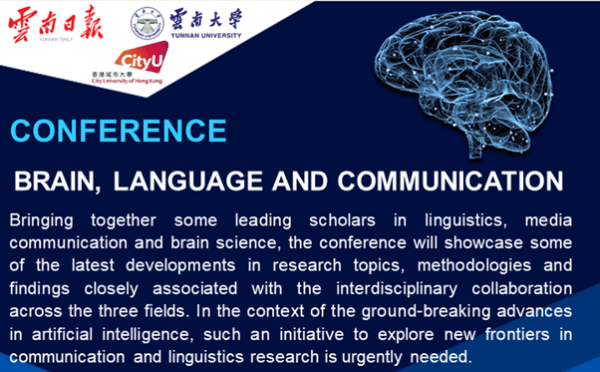
Source: https://hallidaycentre.cityu.edu.hk/12_Kunming_2024.html
On the 26th April, Professor Tony McEnery met with Prof Alex Fang (方稱宇), Director of the Halliday Centre for Intelligent Applications of Language Studies, City University of Hong Kong. They discussed matters related to joint collaborations and dearly remembered those whom they knew in common, including Prof Sidney Greenbaum at UCL, Shichun Gui at Guangdong University of Foreign Studies, Michael Halliday at Sydney and Geoffrey Leech at Lancaster, who inspired them immensely in their corpus-based approaches to language. The Computational Analysis of English (Longman 1987) given by Geoff to Tony and by Shichun to Alex prompted both of them into computational experiments on corpus data using programming languages such as LISP and Prolog.
Source: https://hallidaycentre.cityu.edu.hk/08_news.html
On April 30th, Professor Tony McEnery delivered a Distinguished Lecture in Humanities: ‘AI, Ethics, and the Humanities in the UK,’ at the Faculty of Humanities, The Hong Kong Polytechnic University (PolyU). The lecture surveyed the intersection of artificial intelligence (AI), ethics, and the humanities in the UK. It integrated insights from bibliometric analyses, interviews with various stakeholders, and reviews of existing research infrastructure and policies. The talk examined the current state of AI ethics research in the UK, identifying the contributions of the arts and humanities, the obstacles researchers face, and the potential impacts of their work. It also considered the international research environment and strategic investments made by other countries in AI and ethics, drawing comparisons with the UK’s approach. Opportunities and threats were identified in the contexts of academia, public perception, and commerce, including the impacts of AI on diverse populations and industries. The talk concluded by comparing the situation in the UK with that in Hong Kong.
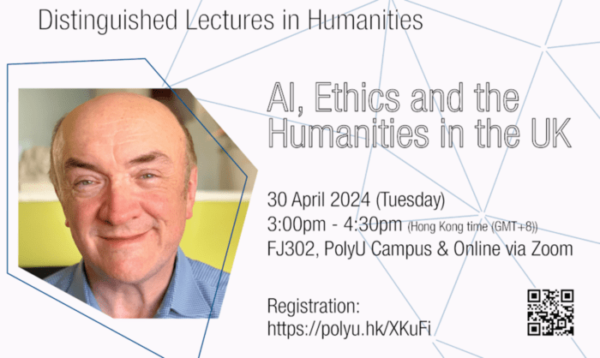
Sources: https://www.polyu.edu.hk/events/2024/4/0430_distinguished-lectures-in-humanities and https://www.polyu.edu.hk/fh/news-and-events/event/2024/4/dlh_20240430
- Click here to view Global China Academy Council Chair Professor Tony McEnery’s Academic Activities in China, September-November 2023.
- Click here to view Global China Academy Council Chair Professor Tony McEnery’s Academic Activities in China, April-May 2023.
- Click here to visit Professor Tony McEnery FGCA page.
- Click here to visit News section.

